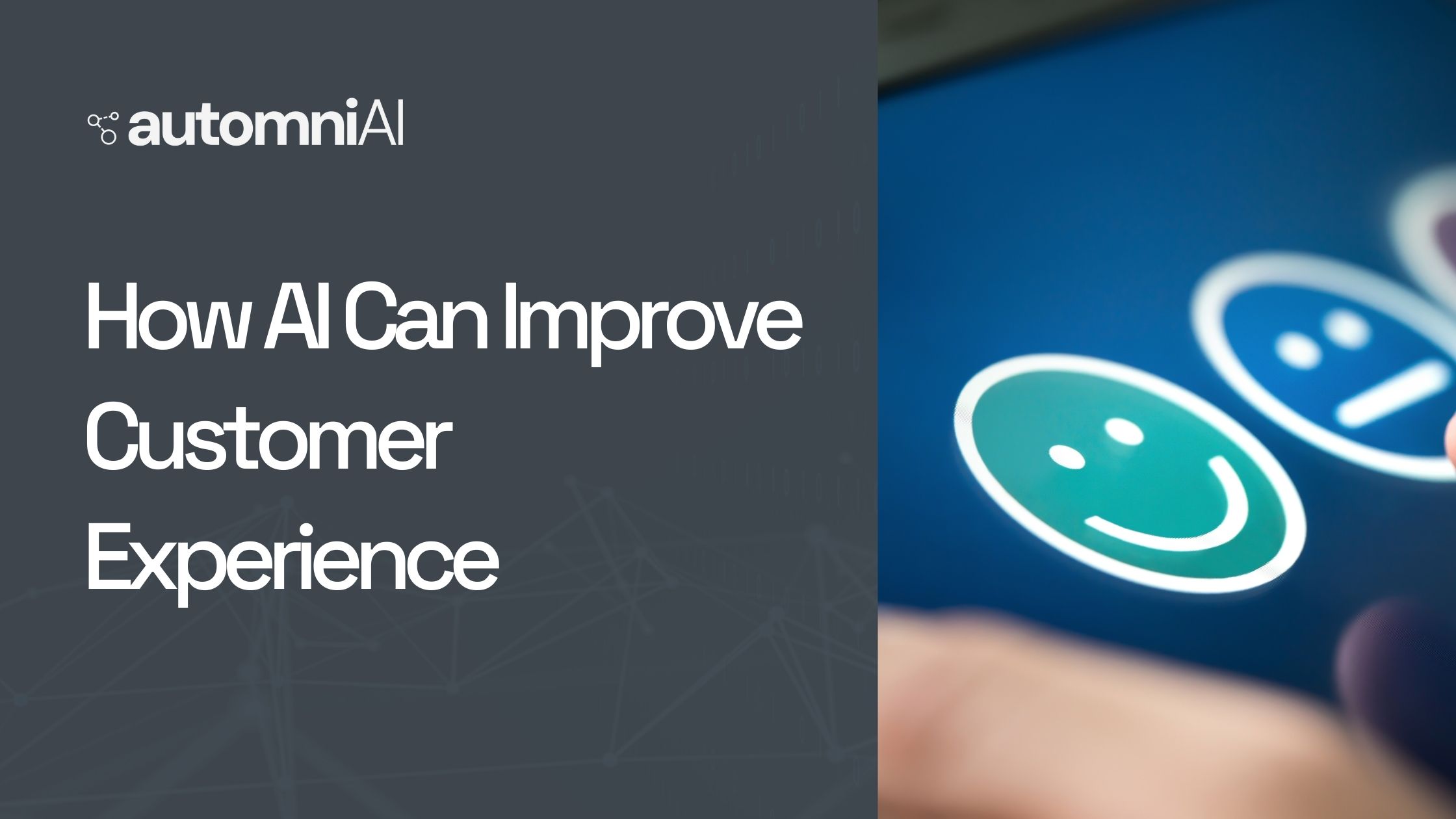In today’s digital world, businesses need more than just traditional marketing to attract and retain…

How AI Can Improve Customer Experience
In today’s digital world, businesses must continuously evolve to meet customer expectations. Artificial Intelligence (AI) has become a game-changer, enhancing customer experience (CX) with personalized, efficient, and proactive solutions. From AI-driven chatbots to predictive analytics, businesses are leveraging AI to provide seamless interactions and build stronger customer relationships.
With AI, companies can analyze vast amounts of data, anticipate customer needs, and offer real-time assistance. This not only boosts satisfaction but also increases brand loyalty and revenue. As AI continues to advance, its impact on customer experience will only grow.
Understanding Customer Experience (CX)
What is Customer Experience?
Customer experience refers to the overall perception a customer has about a brand based on their interactions throughout the customer journey. It includes browsing a website, engaging with customer service, making a purchase, and receiving after-sales support.
Key Factors Affecting CX
- Personalization: Customers expect experiences tailored to their preferences.
- Speed and Efficiency: Quick responses and seamless interactions are crucial.
- Consistency Across Channels: Brands must maintain uniformity across platforms.
- Proactive Support: Anticipating customer needs improves satisfaction.
If businesses fail to prioritize customer experience, they risk losing customers to competitors. AI helps address these challenges by making CX more efficient and engaging.
The Role of AI in Customer Experience
How AI Enhances CX
AI transforms customer experience by personalizing interactions, predicting behavior, and automating customer support.
- Personalization: AI analyzes customer data to offer tailored recommendations and marketing messages.
- Predictive Analytics: AI forecasts customer needs, allowing businesses to proactively offer solutions.
- Automation: AI-powered chatbots and virtual assistants provide instant support, improving efficiency.
AI-driven solutions help businesses deliver superior customer experiences while reducing operational costs.
AI-Powered Chatbots and Virtual Assistants
How AI Chatbots Improve Customer Support
AI chatbots are revolutionizing customer service by providing instant responses and resolving queries efficiently.
Benefits of AI Chatbots:
- 24/7 Availability: Customers receive support anytime, anywhere.
- Cost-Effective Solutions: Reduces the need for large support teams.
- Faster Response Times: AI chatbots resolve queries instantly.
- Multilingual Support: AI enables communication in multiple languages.
Many businesses, including Sephora and H&M, use AI chatbots for product recommendations and order tracking, improving customer engagement.
AI-Driven Personalization
How AI Delivers Personalized Experiences
Personalization is a key factor in customer satisfaction, and AI plays a crucial role in delivering customized experiences.
- Tailored Product Recommendations: AI suggests products based on browsing history.
- Personalized Email Campaigns: AI optimizes marketing strategies by targeting specific preferences.
- Dynamic Content Customization: AI adjusts website content based on user behavior.
For example, Spotify curates personalized playlists based on listening habits, enhancing user engagement.
Predictive Analytics for Better Service
How Predictive Analytics Improves CX
AI’s predictive analytics capabilities allow businesses to anticipate customer needs and offer solutions before a problem arises.
- Identifying Trends: AI predicts future customer preferences.
- Reducing Churn Rates: AI detects signs of customer dissatisfaction early.
- Optimizing Inventory Management: AI helps businesses stock products based on demand.
Predictive analytics ensures businesses stay ahead of customer expectations, creating a seamless experience.
AI in Omnichannel Support
Creating a Unified Customer Experience
Customers interact with brands across multiple platforms, from websites to social media. AI-powered omnichannel support ensures consistency and efficiency.
How AI Enhances Omnichannel Support:
- Seamless Customer Experience: AI integrates data across channels.
- Automated Responses: Chatbots provide instant answers on different platforms.
- Intelligent Routing: AI directs queries to the appropriate department.
For example, Starbucks uses AI to unify customer data from its mobile app, website, and in-store purchases, ensuring a consistent experience.
AI for Faster Query Resolution
Reducing Customer Wait Times with AI
Long wait times frustrate customers. AI speeds up query resolution through automation and self-service options.
AI’s Impact on Query Resolution:
- Instant Support via Chatbots: AI responds immediately.
- Automated Ticketing Systems: AI prioritizes queries for faster resolution.
- Self-Service Portals: AI-powered knowledge bases allow customers to find solutions independently.
Banking apps use AI to help customers check balances, track transactions, and manage accounts without human intervention.
AI and Sentiment Analysis
Understanding Customer Emotions with AI
AI-powered sentiment analysis helps businesses gauge customer satisfaction by analyzing reviews, feedback, and social media interactions.
How AI Performs Sentiment Analysis:
- Natural Language Processing (NLP): AI interprets text and determines sentiment.
- Real-Time Feedback Monitoring: AI tracks social media comments and reviews.
- Proactive Issue Resolution: Businesses address concerns before they escalate.
Brands use AI to monitor customer sentiment on Twitter and quickly respond to complaints, improving reputation.
AI-Powered Voice Assistants
How Voice AI Enhances Customer Experience
Voice assistants like Alexa, Siri, and Google Assistant are changing how customers interact with technology.
Benefits of AI Voice Assistants:
- Hands-Free Convenience: Customers can search for products and place orders using voice commands.
- Faster Support: AI voice assistants provide quick answers.
- Integration with Smart Devices: AI enhances the smart home experience.
For instance, Domino’s Pizza enables customers to place orders via voice assistants, streamlining the process.
AI in E-commerce and Retail
Enhancing Online Shopping with AI
E-commerce and retail businesses use AI to personalize shopping experiences and optimize inventory.
AI Applications in Retail:
- Smart Product Recommendations: AI suggests relevant products.
- Virtual Shopping Assistants: AI helps customers find what they need.
- Visual Search: AI allows customers to upload images to find similar products.
Amazon and Alibaba use AI to improve product recommendations, increasing customer satisfaction and sales.
AI and Fraud Detection in CX
Enhancing Security with AI
Security is a major concern for customers, especially in online transactions. AI helps detect and prevent fraud by analyzing patterns and identifying suspicious activities.
AI’s Role in Fraud Prevention:
- Real-Time Fraud Detection: AI monitors transactions for anomalies.
- Behavioral Analysis: AI identifies unauthorized activity.
- Biometric Authentication: AI enables facial recognition and fingerprint scanning.
PayPal and Mastercard use AI-driven fraud detection to protect customer transactions and prevent cyber threats.
Challenges of Implementing AI in Customer Experience
Overcoming AI Implementation Barriers
Despite its benefits, businesses face challenges when integrating AI into their CX strategies.
Common Challenges:
- Ethical Concerns: AI must remain unbiased and fair.
- Data Privacy Risks: AI relies on customer data, raising security concerns.
- High Costs: AI implementation requires investment.
- Customer Trust Issues: Some customers hesitate to engage with AI services.
To succeed, businesses must implement ethical AI practices, ensure data protection, and educate customers on AI’s benefits.
The Future of AI in Customer Experience
Emerging Trends in AI-Driven CX
AI will continue to evolve, shaping the future of customer experience.
Future AI Trends:
- Hyper-Personalization: AI will offer even more customized experiences.
- Emotion Recognition: AI will analyze facial expressions and voice tones.
- AI and Augmented Reality (AR): AI will enhance virtual shopping experiences.
- Voice Commerce: More businesses will adopt AI-powered voice shopping.
Companies that embrace AI trends will gain a competitive edge in customer experience.
Conclusion
AI is revolutionizing customer experience by providing personalized, efficient, and proactive solutions. From chatbots and predictive analytics to sentiment analysis and fraud detection, AI enables businesses to deliver superior customer experiences.
As AI technology advances, businesses must adopt AI-driven strategies to meet evolving customer expectations. By leveraging AI, companies can improve customer satisfaction, increase brand loyalty, and drive long-term success.
FAQs
1. How does AI improve customer experience?
AI enhances customer experience by providing personalized recommendations, automating customer support, predicting customer behavior, and reducing response times.
2. What are AI chatbots, and how do they help businesses?
AI chatbots are virtual assistants that provide instant customer support, answer queries, and assist with transactions, improving efficiency and customer satisfaction.
3. Is AI safe for customer interactions?
Yes, AI is designed to ensure secure interactions, but businesses must implement data protection measures to maintain customer trust.
4. How can businesses use AI for personalization?
Businesses use AI to analyze customer data and deliver tailored recommendations, personalized emails, and customized website experiences.
5. What is the future of AI in customer experience?
AI will continue to evolve with hyper-personalization, emotion recognition, augmented reality integration, and voice commerce, enhancing CX further.




Comments (0)